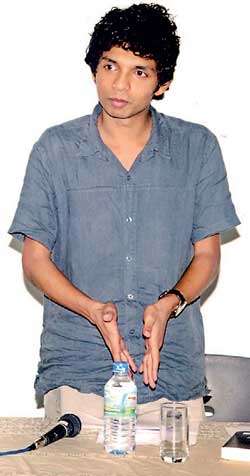Reply To:
Name - Reply Comment

In a speech titled “Can the Subaltern Speak English?” delivered at the International Centre for Ethnic Studies in Kandy on August 9, Dhanuka Bandara takes to task those he sees as academic messiahs who write about emancipating the marginalised Other who cannot wield English as the privileged can. For Dhanuka, such “messianism” is a cover for “crass careerism”, a path to de-hegemonisation of language standards that promotes traditional intellectuals (“reactionary appendages of dominant minorities”) over organic intellectuals (“at the forefront of social change”). Such careerists can only speak of the marginalised Other (the “native non-English speaker”) in terms they can relate to, based overwhelmingly on Western scholarship.
 Over the course of his speech Dhanuka refers to, among others, Arjuna Parakrama, Godfrey Gunatilleke, and the late Manique Gunasekara, and contends that the work of these three intellectuals revolves around one pressing question: how does one deliver an English education to a country to which “English” has always been at best an alien experience, and if so, how can one deliver it via an authentic “ Lankan” experience?
Over the course of his speech Dhanuka refers to, among others, Arjuna Parakrama, Godfrey Gunatilleke, and the late Manique Gunasekara, and contends that the work of these three intellectuals revolves around one pressing question: how does one deliver an English education to a country to which “English” has always been at best an alien experience, and if so, how can one deliver it via an authentic “ Lankan” experience?
Parakrama condemns the inability of English educationalists to relate what is taught to the society around them (because of texts which overwhelmingly relate foreign items, from fruits to films), an issue that is supplemented by an even bigger one: “the current paradigm that Lankan history is the triumphal march of Buddhism.” In other words, according to Parakrama, not only is the rural student unaware of what is taught in English textbooks, he is made to grapple with another tier of exclusion: the Sinhala Buddhist hegemony that holds sway over our education system.
Dhanuka’s issue with this line of thinking is that, at one level, it is a promotion of a way of teaching English that limits the rural child’s way of seeing. Which is true, I should think. Much of the discourse surrounding English Our Way (which Malinda Seneviratne tore to pieces years ago), after all, is rooted in the assumption that we should all speak English the way we and our countrymen want, free of grammatical and syntactical constraints. This culture of “linguistic licentiousness” has, at the end of the day, the effect of promoting a rift between those who speak and those who “spik”, between those who can wield the language and those who can barely put two words together. Dhanuka’s speech in that sense sheds light on another aspect of this debate: are those who idolise Sri Lankan English, as Orwell once put it, saints who should be “judged guilty until they are proven innocent”?
Dhanuka himself an eloquent writer of English that he is, he came from a Sinhala speaking background, didn’t go to a popular or private school,
In my experience so far, limited though it is, “English education” is not a problem prefixed by social class and background. At a basic level, there are “poor” children, coming from rural backgrounds, who can speak the language better than their more privileged counterparts from the city. It is also not a problem of experience, which means that the debate over whether our textbooks should limit the items and other things (again, from fruits to films) to what is “local” is actually a nonentity.
Dhanuka himself is a case in point: eloquent writer of English that he is, he came from a Sinhala speaking background, didn’t go to a popular or private school, and learnt the language on his own. But then, as he points out, he “first experienced snow two years ago” and “learnt by rote Robert Frost’s ‘Stopping by the Woods on a Snowy Evening’ in Grade Eleven”, and yet “[did] not recall any particular difficulty relating to it.”
I myself can think of several encounters I’ve had with students who, while alienated from foreign experiences, nevertheless relate to them quite instinctively. (Just get them to watch an American thriller film and you’ll see how they react.) Neither social class nor inability to relate to foreign experiences, factors though they may be, seems then to have much of a say in determining why one class grows up ignorant of English and another grows up wielding it as though it were the most natural thing.
The issue of class, in the context of English education, has been examined from every angle by scholars like Parakrama and Gunasekara. Parakrama’s didactic assessments of this problem (read his essay “Naduth Unge Baduth Unge: Some Thoughts on the Language of Privilege and the Privileges of Language”, which Dhanuka refers to in his speech) can be simplified to an observation Doric de Souza once made: that the items exhibited in English textbooks are outside the frame of reference of the typical Sri Lankan child. Parakrama offers a more academic take on this:
“There is no room for the radical alterity of these who are not caught within the nexus of power/access to power/the possibility of access to power in the future. For those outside the pale, as it were, the logic of resistance and protest as we understand it does not clinch. For this group for whom the trendy term would be ‘subaltern’, other paradigms of resistance and protest need to be conceptualized, since, to echo Ranajith Guha, there is dominance without hegemony.”
In other words, the subaltern, who happen to be the majority, are denied the very tools of resistance which a proper English education should equip them with. English in this sense can be both a “kaduwa” (oppressive) and a “hiramanaya” (utilitarian), and in the right hands, it can turn from the one to the other.
The reductionism of this Elite/Other dichotomy is felt in every debate, but nowhere else has it been felt more than in the debate over English education. What it does, as Dhanuka and other scholars opposed to the tenets of Sri Lankan English have argued, is to presume the ignorance of the rural child and the eliteness of the urban child, and the God given right of academics to “safeguard” the “innocence” of the rural child by (inadvertently) preserving the rift between him and his urban counterpart, when the reality can and should be quite different. Or as Dhanuka puts it:
“... the assumption is that so called subalterns remain as empty vessels, they do not have the language to curse, are bereft of means of resistance, unless they receive their liberation as a benevolent gift from those who oppress them.”
Given that I certainly am not up to the task of examining this issue from an academic standpoint, a few heretical thoughts on the way English is viewed by the typical child, and the gradation in perceptions, prejudices, and perspectives regarding the subject of English between the rural and the urban child, are, I feel, called for.
The typical Sinhala speaking student (I unfortunately have not had encounters with Tamil speaking students, yet) has a name for English in their dictionary: “kadda”. It is a corruption of “kaduwa” and it is derived from the saying “kadden kotanawa” (“using language as a sword to brush away people”).
Interestingly enough, perhaps owing to the culture of complacency regarding the teaching of the language we’ve institutionalised over the decades, “kadda” is not a term of disparagement or fear. On the contrary, it is used whimsically, not to ridicule the non speaker of English, but to refer to and ridicule the speaker. (Whenever I pick up the phone and speak in front of them, I hear their giggles as they try to imitate me and poke fun at the mistakes they make.) The young non English speaker no longer regrets his lack of English education; he laughs at it and that by consciously laughing at the errors he commits. Be it Royal College or Kekirawa Central, this process plays out in almost exactly the same way.
This presents us with rather interesting cultural phenomena, the way I see it: the ability of the non English speaking child to compensate for his failure to wield the language by resorting to a colloquialism with obvious colonial overtones (“kaduwa” as a term of disparagement of English traces its roots to postcolonial Ceylonese society) while being indifferent to or ignorant of those same overtones. In other words, the Sinhala speaking child views English through a dualistic lens: he realises its importance in a society that prioritises spoken over written English (most of the students I interviewed wanted to speak and pronounce, not to read and write), but he no longer views it as the step up the social ladder it used to be before.
Ironically, globalisation, which has “advertised” elocution in our society (which belong to the “outer circle” of Braj Kachru’s “World Englishes” model), is to blame for that: it has made it possible for the non English speaker to let go of the language, since he seeks other ways of climbing that ladder: through material things that are marketed day in and day out, rather than through ideas.
Dhanuka’s speech thus stands out because the Elite/Other dichotomy no longer holds water, since English is no longer the dominant hegemony it used to be. 50 years ago, the English speaker was privileged. He still is today, but the structures of poverty in our society have emboldened the non English speaker to “ignore” his ignorance and yet enjoy “the good life.” As a final point, we can therefore say that the non English speaker, regardless of whether he attends Royal College or Kekirawa Central, has succeeded in compensating for his weakness in the language via casual, illusory self-mockery. This, for me, is the real tragedy we should be looking at.